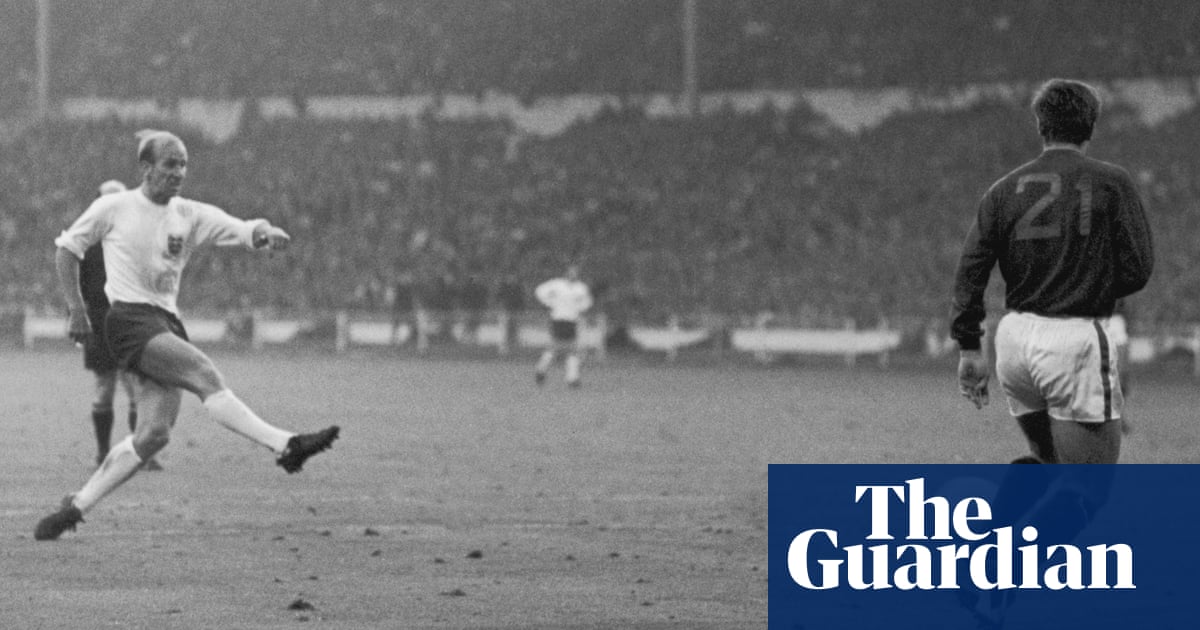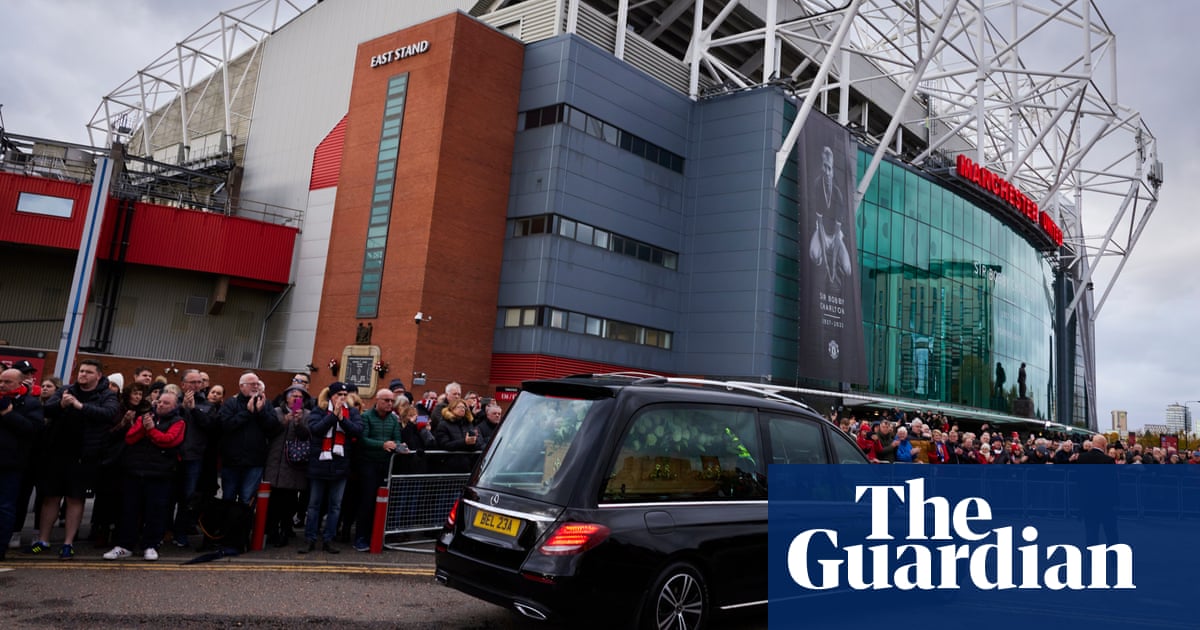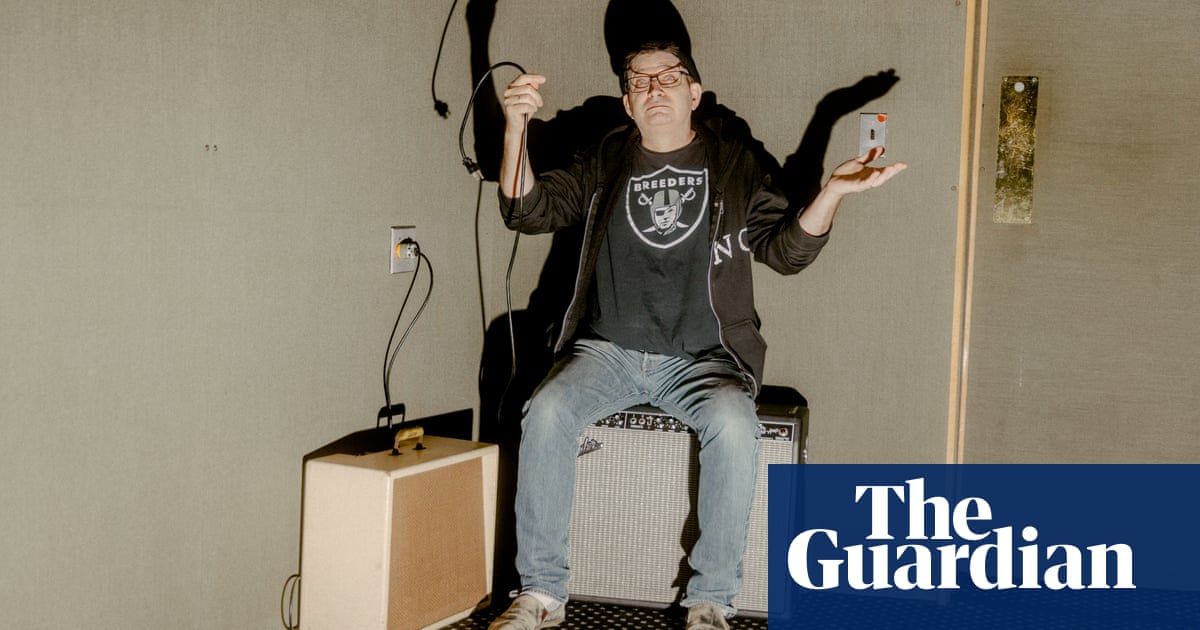
Scotland 0 England 4: Hampden Park, Glasgow, 19 April 1958
Selected on the left wing, Charlton thought he had been called up for England too soon. “I think they felt sorry for me because of Munich,” the 20 year old said.
England nevertheless took the young United player to the first of his four World Cups in 1958, and though Charlton never made it on to the pitch in Sweden he did mark his international debut with a goal in front of 134,000 at Hampden. It was the type of goal he would score on many more occasions for England, running on to a pass from Tom Finney and hitting a powerful shot on the run, but a Scottish audience had the pleasure of witnessing the first.
“I can still remember the sound of the ball lashing against the net,” Charlton recalled. “After that all you could hear was silence.”
Borussia Dortmund 1 Manchester United 6: Westfalenstadion, Dortmund, 11 November 1964
United only won the title on goal difference from Leeds in 1964-65, but with Charlton, Law and Best now established in the side some of their victories were emphatic. They beat Liverpool 3-0, Aston Villa 7-0 and Blackburn Rovers 5-0 at Ewood Park. Charlton scored a hat-trick at Blackburn, prompting an admiring Nobby Stiles to remark: “Bobby played them on his own.”
So it was in Europe, when United encountered the West German Cup winners Dortmund en route to the semi-final of the Inter-Cities Fairs Cup, yet to evolve into the Uefa Cup. Inspired by a Charlton hat-trick United killed the tie stone dead in the first leg in West Germany, before Charlton claimed another two at Old Trafford to progress 10-1 on aggregate.
Charlton was performing in a more central role now, and racking up the goals with his ability to shoot powerfully from distance.
England 2 Mexico 0: Wembley, London, 16 July 1966
It was often said of Charlton that while not necessarily the greatest goalscorer, he scored some of the greatest goals, and his opener against Mexico was certainly one of the most memorable.
It was England’s first goal of the tournament they were hosting, and after a dour, goalless struggle in the opening game against Uruguay and some cynical anti-football on display in the other groups people were starting to worry the World Cup 66 might be a dismal flop.
Charlton was credited with instantly altering that perception and instilling confidence in both team and country, which he did by picking up the ball in his own half and running with it until a shot became an option. “I picked up the ball quite deep and I had no intention of shooting at first,” he said. “I didn’t really expect them to allow me to keep going, but when they did I just banged it and it came off so sweetly.”
England 2 Portugal 1: Wembley, London, 26 July 1966
It might seem odd to place a semi-final over the final itself, especially when England ran out tournament winners, though Charlton did a job for the team in the 4-2 win over West Germany and concentrated on shadowing Franz Beckenbauer.
He enjoyed much more freedom to express himself in the semi-final against Portugal, and the result was the two goals that took England to the final.
The first was relatively unremarkable, except for a suspicion that it ought to have been disallowed because Roger Hunt was standing offside, but the second was trademark Charlton, who ran on to Geoff Hurst’s square ball and thumped a blistering shot past Pereira without breaking stride. Rather marvellously, pictures of the goal show Charlton still fully off the ground even as the ball hits the back of the net.
“Bobby Charlton had much his best game of the World Cup, perhaps his best ever for England,” Brian Glanville enthused. “His passing was crisp, his running made gaps and he scored both goals.”
Real Madrid 3 Manchester United 3: Bernabéu, Madrid, 15 May 1968
There would have been no Wembley glory against Benfica had not United survived a testing semi—final against Real Madrid that year, and when the home side went into a 4-2 aggregate lead in the second leg at the Bernabéu it looked as if the Busby-Charlton dream was over for another year.
George Best had scored the only goal at Old Trafford to give United a fighting chance, but that lead was quickly wiped out by three Real Madrid strikes, and at half-time the visitors were only on the scoresheet thanks to an own goal. With Denis Law out injured the prospects for progress did not look good, but United put up a tremendous fight in the second half and tied the score with goals from defenders David Sadler and Bill Foulkes.
Charlton had not been hugely influential, yet the sight of him weeping on the pitch at the final whistle gave a clue as to how he regarded the achievement of reaching the final. He subsequently said he had no hesitation in naming the Bernabéu game the greatest he had played in, above even the World Cup final of two years earlier. “Real were murdering us,” he said. “But we battled away after the break and they collapsed.”
Benfica 1 Manchester United 4 (aet): Wembley, London, 29 May 1968
Charlton had claimed there was nothing left for a professional footballer to aim for after winning the World Cup in 1966, though at club level his finest hour was still to come.
United overcame Benfica quite comfortably in the end, thanks in part to Alex Stepney’s important saves from Eusebio, though it is worth remembering that the Lisbon side had almost twice as much European experience as their opponents at the time. United were attempting to become the first English side to lift the European Cup, whereas Benfica had won the trophy twice already.
Charlton was captain on the night that marked the culmination of a European dream that brought the Munich disaster of 10 years earlier back into sharp focus, and there were emotional scenes at the end when he took the trophy to Matt Busby.
Charlton had opened the scoring in normal time with a rare header from David Sadler’s cross, and after Benfica had forced extra time with nine minutes remaining, goals from George Best and Brian Kidd took the game away before a second from the captain completed a remarkable triumph.












